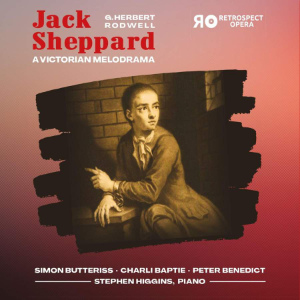
G Herbert Rodwell (1800-1852)
Jack Sheppard (1839)
Play by John Baldwin Buckstone (1802-1879); adaptation by David Chandler and Valerie Langfield
Jack Sheppard – Charli Baptie
Narrator, Blueskin, Jonathan Wild, Mrs Wood, Mendez, John Gay – Simon Butteriss
Owen Wood, Sir Rowland Trenchard, Hogarth – Peter Benedict
Thomas Darrell, Quilt, Slimkid – Daniel Huttlestone
Winny – Emily Vine
Stephen Higgins (piano)
rec. 2023, Richard Burnett Heritage Collection, Royal Tunbridge Wells, UK
Full text included
Retrospect Opera RO010 [68]
I admire Retrospect Opera but this is an extremely difficult disc to review.
It preserves a theatrical melodrama compiled by John Baldwin Buckstone and based on the novel by William Ainsworth that celebrates the life of Jack Shepherd (1702-1724), the youthful jail-breaker who inspired John Gay’s The Beggar’s Opera of 1728. The libretto and songs were published but instrumental music has not survived so suitable music from another work by Rodwell, The Flying Dutchman (another melodrama) has been inveigled into the production in piano reduction form making this is abridged adaptation – Act I has been excised, for example. An abridged example of what, though? Of a musical play with sensationalistic effects with brief music, performed with piano. The production preserves three original Rodwell songs.
Rodwell was certainly one of the most eminent composers of theatrical melodrama but this is a genre that leans far more on words than music, at least in the incomplete form in which it has survived, like this work. A production such as this is eminently valuable as an index of the popularity of the genre but it does move this label’s brief away from the loose interpretation of opera whether table entertainments such as Dibdin’s The Wags – which I hugely enjoyed (review) – or the more straightforwardly operatic The Soldier’s Legacy (review) by Macfarren. In brief, it moves the label’s remit largely from music to spoken word and that’s where my problem lies. Of the 68 minutes only about 15 contain music. The rest is spoken text.
The songs are Claude Duval, The Carpenter’s Daughter, The Jolly Nose, Return, O My Love, Farewell my Rory Tories(one for the lefties among you), St Giles’s Bowl – which is set to the tune of If the Heart of a Man – and the most popular of them all, the splendid Nix My Dolly, for which you’ll be grateful of the glossary provided, so chockfull is it with the argot of the day.
The brief piano commentaries cannot help sounding like the more melodramatic elements of accompaniments to silent film but that’s perhaps not surprising if one traces accompanied film music right back to Victorian entertainments such as Jack Shepherd and its confreres. It suggests a lineage that can profitably be explored. The songs themselves are sung and put over with spirit and lusty engagement. The central role is taken by Charli Baptie, appropriately when young Jack is 13 though somewhat less plausibly when he’s 22. Nevertheless, this trouser role is communicatively taken even when Jack sounds, as s/he does, from time to time, like the late Babs Windsor. Simon Butteriss takes several roles including that of the vengeful Jonathan Wild and does so with a panoramic command of arch, haughty and campy registers. The pianist is Stephen Higgins and the acoustic is the domestic one of the Richard Burnett Heritage Collection, Royal Tunbridge Wells. Full texts are provided.
Whilst I admire the diligence and editorial work that has gone on here, I’m at something of a loss to know what to say about it. Yes, it presents an adaptation of a significant if transitory genre but that genre, as it survives here, is largely spoken. Is it not better off presented on radio? The songs are good but would their extraction onto a single disc presenting surviving songs from other melodramas – a Melodrama Greatest Hits disc – really be such a bad thing? Who will listen to the text more than once? Not I, said the walrus.
Jonathan Woolf
Help us financially by purchasing from



















